- Home
- Ken Follett
The Man From St. Petersburg
The Man From St. Petersburg Read online
Table of Contents
Title Page
Copyright Page
Acknowledgements
Epigraph
ONE
TWO
THREE
FOUR
FIVE
SIX
SEVEN
EIGHT
NINE
TEN
ELEVEN
TWELVE
THIRTEEN
FOURTEEN
FIFTEEN
EPILOGUE
ABOUT THE AUTHOR
Praise for Ken Follett and his bestselling novels
"Follett is a master."--Time
"An artist of compelling talents."--The Philadelphia Inquirer
"Ken Follett can hold his own with the best."
--The Indianapolis Star
"Masterful. . . . Plot and counterplot, treachery, cunning, and killing . . . keep you on the edge every moment."
--The Associated Press
"Razor-sharp . . . harrowing . . . a cleverly crafted, easily read novel."--The Dallas Times-Herald
"Follett's great strength is his female characters--they are smart, strong, independent, and when they love a man, by golly, he knows the game is up."--People
"An absolutely terrific thriller, so pulse pounding, so ingenious in its plotting, and so frighteningly realistic that you simply cannot stop reading."--Publishers Weekly
"Can Follett write . . . ? He outclasses his competitors."
--Newsday
ALSO BY KEN FOLLETT
The Modigliani Scandal
Paper Money
Eye of the Needle
Triple
The Key to Rebecca
On Wings of Eagles
Lie Down with Lions
The Pillars of the Earth
Night over Water
A Dangerous Fortune
A Place Called Freedom
The Third Twin
The Hammer of Eden
Code to Zero
Jackdaws
New American Library
Published by New American Library, a division of
Penguin Group (USA) Inc., 375 Hudson Street,
New York, New York 10014, U.S.A.
Penguin Books Ltd, 80 Strand,
London WC2R 0RL, England
Penguin Books Australia Ltd, 250 Camberwell Road,
Camberwell, Victoria 3124, Australia
Penguin Books Canada Ltd, 10 Alcorn Avenue,
Toronto, Ontario, Canada M4V 3B2
Penguin Books (N.Z.) Ltd, Cnr Rosedale and Airborne Roads,
Albany, Auckland 1310, New Zealand
Penguin Books Ltd, Registered Offices:
80 Strand, London WC2R 0RL, England
First New American Library Trade Paperback Printing, June 2003
Copyright (c) Fineblend N.V., 1982 All rights reserved
The quotation on pp. 48 is taken from The London Times of June 14, 1914.
The quotation on pp. 215-16 is taken from The London Times of June 29, 1914.
"After the Ball" on p. 195 was written by Charles K. Harris and published in Great Britain by Francis
Day & Hunter.
REGISTERED TRADEMARK--MARCA REGISTRADA
Without limiting the rights under copyright reserved above, no part of this publication may be reproduced, stored in or introduced into a retrieval system, or transmitted, in any form, or by any means (electronic, mechanical, photocopying, recording, or otherwise), without the prior written permission of both the copyright owner and the above publisher of this book.
PUBLISHER'S NOTE
This is a work of fiction. Names, characters, places, and incidents either are the products of the author's imagination or are used fictitiously, and any resemblance to actual persons, living or dead, business establishments, events, or locales is entirely coincidental.
BOOKS ARE AVAILABLE AT QUANTITY DISCOUNTS WHEN USED TO PROMOTE PRODUCTS OR SERVICES. FOR INFORMATION PLEASE WRITE TO PREMIUM MARKETING DIVISION, PENGUIN GROUP (USA) INC., 375 HUDSON STREET, NEW YORK, NEW YORK 10014.
The scanning, uploading and distribution of this book via the Internet or via any other means without the permission of the publisher is illegal and punishable by law. Please purchase only authorized electronic editions, and do not participate in or encourage electronic piracy of copyrighted materials. Your support of the author's rights is appreciated.
eISBN : 978-1-10104388-2
https://us.penguingroup.com
ACKNOWLEDGMENTS
In writing this book I was helped by many friends. My grateful thanks to Alan Earney, Pat Golbitz, M. E. Hirsh, Elaine Koster, Diana Levine, Caren Meyer and her moles, Sue Rapp, Pamela Robinson and the staff of Bertram Rota Ltd., Hilary Ross, Christopher Sinclair-Stevenson, Daniel Starer, Colin Tennant, and--alphabetically last but in every other way first--Al Zuckerman.
"One can't love humanity. One can only love people."
--GRAHAM GREENE
ONE
It was a slow Sunday afternoon, the kind Walden loved. He stood at an open window and looked across the park. The broad, level lawn was dotted with mature trees: a Scotch pine, a pair of mighty oaks, several chestnuts and a willow like a head of girlish curls. The sun was high and the trees cast dark, cool shadows. The birds were silent, but a hum of contented bees came from the flowering creeper beside the window. The house was still, too. Most of the servants had the afternoon off. The only weekend guests were Walden's brother George, George's wife, Clarissa, and their children. George had gone for a walk, Clarissa was lying down and the children were out of sight. Walden was comfortable: he had worn a frock coat to church, of course, and in an hour or two he would put on his white tie and tails for dinner, but in the meantime he was at ease in a tweed suit and a soft-collared shirt. Now, he thought, if only Lydia will play the piano tonight, it will have been a perfect day.
He turned to his wife. "Will you play, after dinner?"
Lydia smiled. "If you like."
Walden heard a noise and turned back to the window. At the far end of the drive, a quarter of a mile away, a motor car appeared. Walden felt a twinge of irritation, like the sly stab of pain in his right leg before a rainstorm. Why should a car annoy me? he thought. He was not against motor cars--he owned a Lanchester and used it regularly to travel to and from London--although in the summer they were a terrible nuisance to the village, sending up clouds of dust from the unpaved road as they roared through. He was thinking of putting down a couple of hundred yards of tarmacadam along the street. Ordinarily he would not have hesitated, but the roads had not been his responsibility since 1909 when Lloyd George had set up the Roads Boards--and that, he realized, was the source of his irritation. It had been a characteristic piece of Liberal legislation: they took money from Walden in order to do themselves what he would have done anyway; then they failed to do it. I suppose I'll pave the road myself in the end, he thought; it's just annoying to pay for it twice.
The motor car turned into the gravel forecourt and came to a noisy, shuddering halt opposite the south door. Exhaust fumes drifted in at the window, and Walden held his breath. The driver got out, wearing a helmet, goggles and a heavy motoring coat, and opened the door for the passenger. A short man in a black coat and a black felt hat stepped down from the car. Walden recognized the man and his heart sank: the peaceful summer afternoon was over.
"It's Winston Churchill," he said.
Lydia said: "How embarrassing."
The man just refused to be snubbed. On Thursday he had sent a note, which Walden had ignored. On Friday he had called on Walden at his London house and had been told that the Earl was not at home. Now he had driven all the way to Norfolk on a Sunday. He would be turned away again. Does
he think his stubbornness is impressive? Walden wondered.
He hated to be rude to people, but Churchill deserved it. The Liberal government, in which Churchill was a minister, was engaged in a vicious attack on the very foundations of English society--taxing landed property, undermining the House of Lords, trying to give Ireland away to the Catholics, emasculating the Royal Navy and yielding to the blackmail of trade unions and damned socialists. Walden and his friends would not shake hands with such people.
The door opened and Pritchard came into the room. He was a tall Cockney with brilliantined black hair and an air of gravity which was transparently fake. He had run away to sea as a boy and had jumped ship in East Africa. Walden, there on safari, had hired him to supervise the native porters, and they had been together ever since. Now Pritchard was Walden's majordomo, traveling with him from one house to another, and as much of a friend as a servant could be.
"The First Lord of the Admiralty is here, my lord," Pritchard said.
"I'm not at home," Walden said.
Pritchard looked uncomfortable. He was not used to throwing out Cabinet ministers. My father's butler would have done it without turning a hair, Walden thought, but old Thomson is graciously retired, growing roses in the garden of that little cottage in the village, and somehow Pritchard has never acquired that unassailable dignity.
Pritchard began to drop his aitches, a sign that he was either very relaxed or very tense. "Mr. Churchill said you'd say not at 'ome, my lord, and 'e said to give you this letter." He proffered an envelope on a tray.
Walden did not like to be pushed. He said crossly: "Give it back to him--" Then he stopped and looked again at the handwriting on the envelope. There was something familiar about the large, clear, sloping letters.
"Oh, dear," said Walden.
He took the envelope, opened it and drew out a single sheet of heavy white paper, folded once. At the top was the royal crest, printed in red. Walden read:
Buckingham Palace
May 1st, 1914
My dear Walden,
You will see young Winston.
George R.I.
"It's from the King," Walden said to Lydia.
He was so embarrassed that he flushed. It was frightfully bad form to drag the King into something like this. Walden felt like a schoolboy who is told to stop quarreling and get on with his prep. For a moment he was tempted to defy the King. But the consequences . . . Lydia would no longer be received by the Queen, people would be unable to invite the Waldens to parties at which a member of the Royal Family would be present and--worst of all--Walden's daughter, Charlotte, could not be presented at court as a debutante. The family's social life would be wrecked. They might as well go and live in another country. No, there was no question of disobeying the King.
Walden sighed. Churchill had defeated him. In a way it was a relief, for now he could break ranks and no one could blame him. Letter from the King, old boy, he would say in explanation; nothing to be done, you know.
"Ask Mr. Churchill to come in," he said to Pritchard.
He handed the letter to Lydia. The Liberals really did not understand how the monarchy was supposed to work, he reflected. He murmured: "The King is just not firm enough with these people."
Lydia said: "This is becoming awfully boring."
She was not bored at all, Walden thought; in fact, she probably found it all quite exciting; but she said that because it was the kind of thing an English countess would say, and since she was not English but Russian, she liked to say typically English things, the way a man speaking French would say alors and hein? a lot.
Walden went to the window. Churchill's motor car was still rattling and smoking in the forecourt. The driver stood beside it, with one hand on the door, as if he had to hold it like a horse to stop it from wandering away. A few servants were gazing at it from a safe distance.
Pritchard came in and said: "Mr. Winston Churchill."
Churchill was forty, exactly ten years younger than Walden. He was a short, slender man who dressed in a way Walden thought was a shade too elegant to be quite gentlemanly. His hair was receding rapidly, leaving a peak at the forehead and two curls at the temples which, together with his short nose and the permanent sardonic twinkle in his eye, gave him a mischievous look. It was easy to see why the cartoonists regularly portrayed him as a malign cherub.
Churchill shook hands and said cheerfully: "Good afternoon, Lord Walden." He bowed to Lydia. "Lady Walden, how do you do?"
Walden thought: What is it about him that grates so on my nerves?
Lydia offered him tea and Walden told him to sit down. Walden would not make small talk: he was impatient to know what all the fuss was about.
Churchill began: "First of all my apologies, together with the King's, for imposing myself on you."
Walden nodded. He was not going to say it was perfectly all right.
Churchill said: "I might add that I should not have done so, other than for the most compelling reasons."
"You'd better tell me what they are."
"Do you know what has been happening in the money market?"
"Yes. The discount rate has gone up."
"From one and three quarters to just under three percent. It's an enormous rise, and it has come about in a few weeks."
"I presume you know why."
Churchill nodded. "German companies have been factoring debts on a vast scale, collecting cash and buying gold. A few more weeks of this and Germany will have got in everything owing to her from other countries, while leaving her debts to them outstanding--and her gold reserves will be higher than they have ever been before."
"They are preparing for war."
"In this and other ways. They have raised a levy of one billion marks, over and above normal taxation, to improve an army that is already the strongest in Europe. You will remember that in 1909, when Lloyd George increased British taxation by fifteen million pounds sterling, there was almost a revolution. Well, a billion marks is equivalent to fifty million pounds. It's the biggest levy in European history--"
"Yes, indeed," Walden interrupted. Churchill was threatening to become histrionic: Walden did not want him making speeches. "We Conservatives have been worried about German militarism for some time. Now, at the eleventh hour, you're telling me that we were right."
Churchill was unperturbed. "Germany will attack France, almost certainly. The question is, will we come to the aid of France?"
"No," Walden said in surprise. "The Foreign Secretary has assured us that we have no obligations to France--"
"Sir Edward is sincere, of course," Churchill said. "But he is mistaken. Our understanding with France is such that we could not possibly stand aside and watch her be defeated by Germany."
Walden was shocked. The Liberals had convinced everyone, him included, that they would not lead England into war; and now one of their leading ministers was saying the opposite. The duplicity of the politicians was infuriating, but Walden forgot that as he began to contemplate the consequences of war. He thought of the young men he knew who would have to fight: the patient gardeners in his park, the cheeky footmen, the brown-faced farm boys, the hell-raising undergraduates, the languid idlers in the clubs of St. James's . . . Then that thought was overtaken by another, much more chilling, and he said: "But can we win?"
Churchill looked grave. "I think not."
Walden stared at him. "Dear God, what have you people done?"
Churchill became defensive. "Our policy has been to avoid war, and you can't do that and arm yourself to the teeth at the same time."
"But you have failed to avoid war."
"We're still trying."
"But you think you will fail."
Churchill looked belligerent for a moment, then swallowed his pride. "Yes."
"So what will happen?"
"If England and France together cannot defeat Germany, then we must have another ally, a third country on our side: Russia. If Germany is divided, fighting on two fronts
, we can win. The Russian army is incompetent and corrupt, of course--like everything else in that country--but it doesn't matter so long as they draw off part of Germany's strength."
Churchill knew perfectly well that Lydia was Russian, and it was characteristically tactless of him to disparage her country in her presence, but Walden let it pass, for he was highly intrigued by what Churchill was saying. "Russia already has an alliance with France," he said.
"It's not enough," Churchill said. "Russia is obliged to fight if France is the victim of aggression. It is left to Russia to decide whether France is the victim or the aggressor in a particular case. When war breaks out, both sides always claim to be the victim. Therefore the alliance obliges Russia to do no more than fight if she wants to. We need Russia to be freshly and firmly committed to our side."
"I can't imagine you chaps joining hands with the Czar."
"Then you misjudge us. To save England, we'll deal with the devil."
"Your supporters won't like it."
"They won't know."
Walden could see where all this was leading, and the prospect was exciting. "What have you in mind? A secret treaty? Or an unwritten understanding?"
"Both."
Walden looked at Churchill through narrowed eyes. This young demagogue might have a brain, he thought, and that brain might not be working in my interest. So the Liberals want to do a secret deal with the Czar, despite the hatred which the English people have for the brutal Russian regime--but why tell me? They want to rope me in somehow, that much is clear. For what purpose? So that if it all goes wrong they will have a Conservative on whom to put the blame? It will take a plotter more subtle than Churchill to lead me into such a trap.
Walden said: "Go on."
"I have initiated naval talks with the Russians, along the lines of our military talks with the French. They've been going on for a while at a rather low level, and now they are about to get serious. A young Russian admiral is coming to London. His name is Prince Aleksey Andreyevich Orlov."
Lydia said: "Aleks!"
Churchill looked at her. "I believe he is related to you, Lady Walden."

 The Pillars of the Earth
The Pillars of the Earth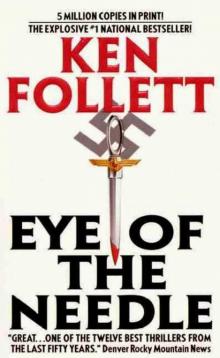 Eye Of The Needle
Eye Of The Needle Lie Down With Lions
Lie Down With Lions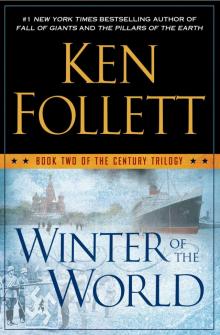 Winter of the World
Winter of the World Triple
Triple World Without End
World Without End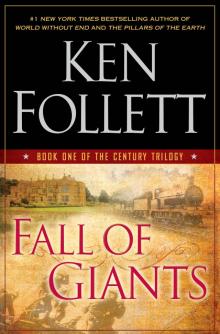 Fall of Giants
Fall of Giants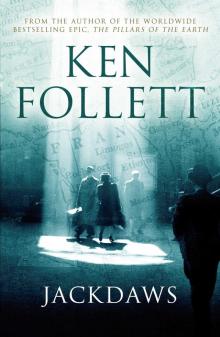 Jackdaws
Jackdaws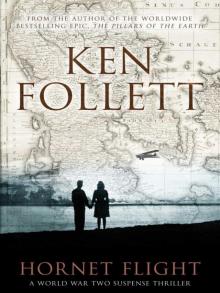 Hornet Flight
Hornet Flight Whiteout
Whiteout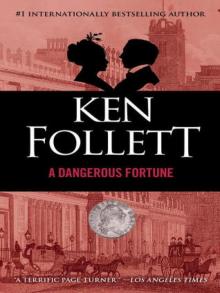 A Dangerous Fortune
A Dangerous Fortune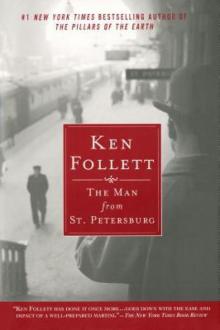 The Man From St. Petersburg
The Man From St. Petersburg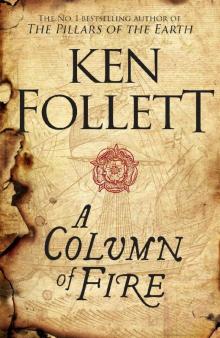 A Column of Fire
A Column of Fire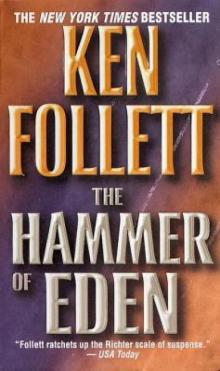 The Hammer of Eden
The Hammer of Eden On Wings of Eagles
On Wings of Eagles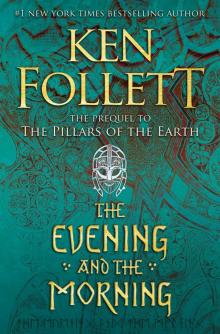 The Evening and the Morning
The Evening and the Morning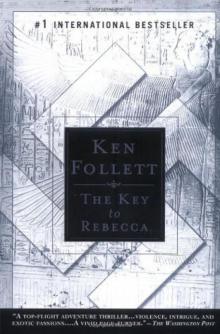 The Key to Rebecca
The Key to Rebecca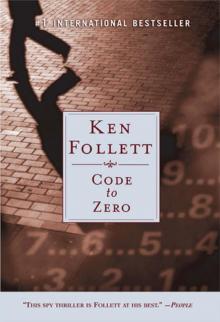 Code to Zero
Code to Zero Paper Money
Paper Money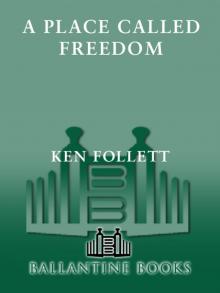 A Place Called Freedom
A Place Called Freedom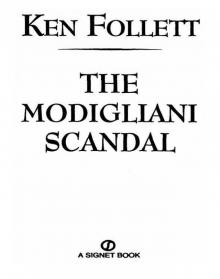 The Modigliani Scandal
The Modigliani Scandal Triple (1991)
Triple (1991)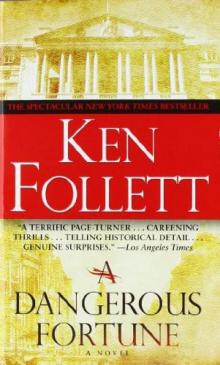 A Dangerous Fortune (1994)
A Dangerous Fortune (1994)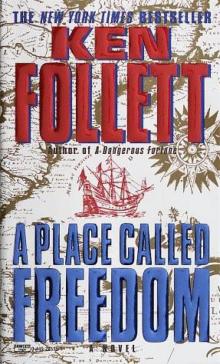 A Place Called Freedom (1995)
A Place Called Freedom (1995)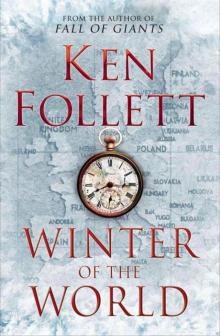 Winter of the World (Century Trilogy 2)
Winter of the World (Century Trilogy 2) Code to Zero (2000)
Code to Zero (2000) On Wings Of Eagles (1990)
On Wings Of Eagles (1990) Storm Island
Storm Island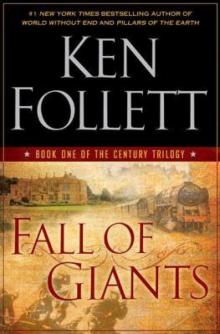 Fall of Giants (The Century Trilogy)
Fall of Giants (The Century Trilogy)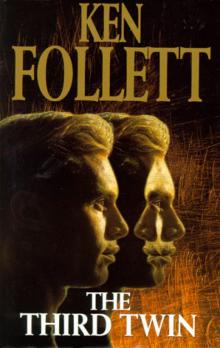 the Third Twin (1996)
the Third Twin (1996)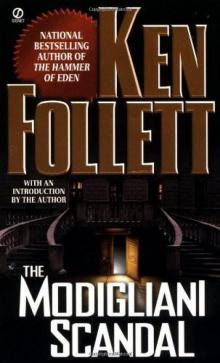 The Modigliani Scandal (1976)
The Modigliani Scandal (1976)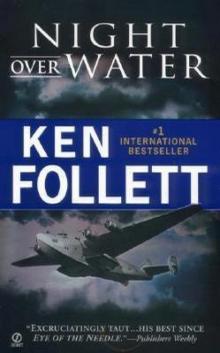 Night Over Water
Night Over Water